To start a plant-based diet, integrate one vegetarian meal weekly, then increase plant-based foods over time. Focus on nutrient-rich sources: legumes, nuts, seeds, and fortified foods for essential vitamins like B12. Stock your pantry with versatile grains, beans, and plant-based milks. Opt for simple recipes like quinoa salad or vegetable stir-fry. When dining out, choose customizable dishes or cuisines with natural plant options like Mediterranean or Asian. For social situations, communicate your dietary needs and seek vegan-friendly restaurants. Budget wisely by buying seasonal produce and affordable protein sources. By following these steps, you'll uncover more effective strategies.
Key Takeaways
- Start with one vegetarian meal a week and gradually increase plant-based foods.
- Ensure sufficient protein intake with legumes, nuts, seeds, and soy products.
- Plan meals ahead and create a detailed grocery list to stay organized.
- Opt for affordable protein sources like beans, lentils, and tofu to save money.
- Incorporate seasonal produce for fresher, cheaper, and tastier meal options.
Understanding a Plant-Based Diet
A plant-based diet focuses on foods derived from plants like fruits, vegetables, nuts, seeds, whole grains, and legumes.
So, you're making the switch from bacon to broccoli, huh? Welcome to the club! This diet excludes animal products, making it a vegan or vegetarian lifestyle.
You'll embrace whole grains and antioxidant-rich goodies that your body will thank you for. Adjusting can be a tad tricky, but it's worth it.
Imagine saving $750 a year—more cash for avocado toast! Plus, these foods are packed with folate and vitamin E, which are fabulous for brain health.
Benefits of Plant-Based Eating
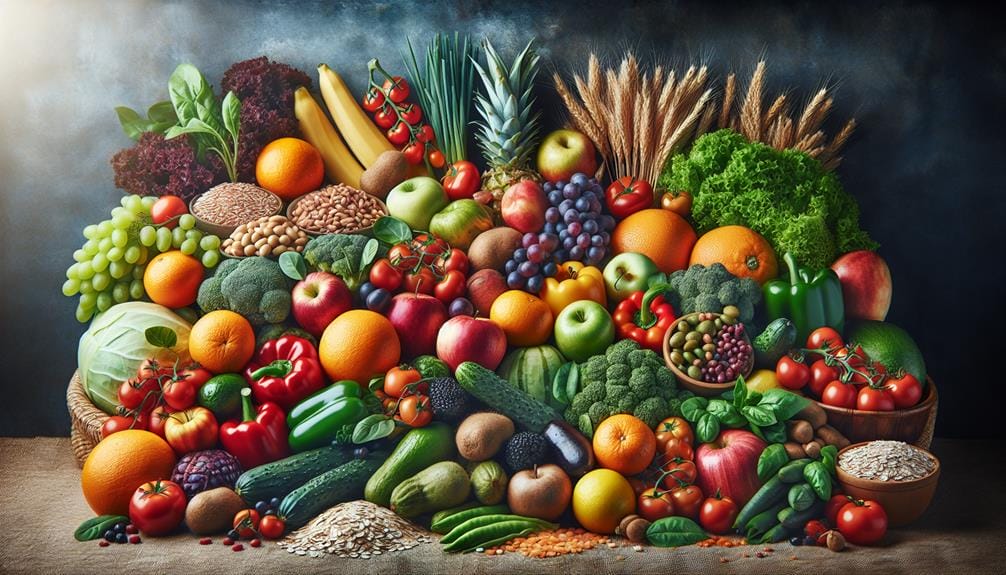
Embracing a plant-based diet brings a host of benefits for your health and the environment. First off, you're not just eating plants; you're easing into a lifestyle for better health! Plant-based foods are packed with fiber, vitamins, and minerals that promote heart health and weight management.
Eating more plant-based meals can lower your risk of chronic diseases like heart disease and diabetes. Plus, your wallet will thank you—transitioning to a plant-based diet can save you around $750 a year!
For beginners, experimenting with plant-based recipes can be a fun and delicious adventure. So, grab those veggies and explore a lifestyle that benefits both you and the planet.
Starting Your Plant-Based Journey
Wondering how to kick off your plant-based journey without feeling overwhelmed? Start with one vegetarian meal a week. Gradually increase plant-based foods, aiming for half your plate to be veggies.
Don't worry, there are plenty of pre-made plant-based options in stores to make life easier, or try meal kits. Use meat as a side dish, not the star of your plate. Focus on beans, vegetables, and whole grains instead.
Create a grocery list and plan your meals ahead to stay on track. By taking these small steps, you'll ease into your plant-based journey smoothly, and before you know it, you'll be a veggie-loving pro! Remember, it's all about progress, not perfection.
Essential Nutrients to Monitor
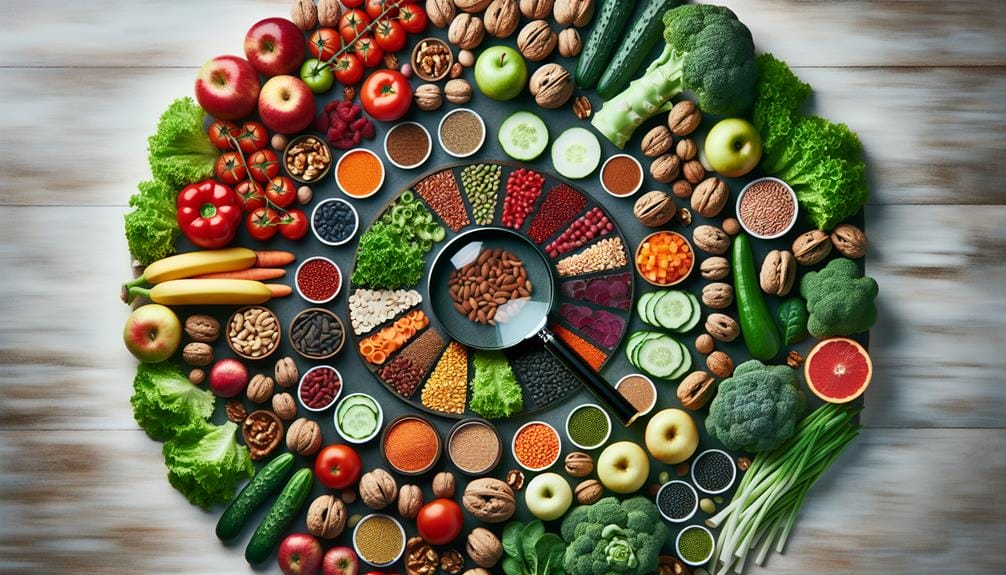
Maintaining a balanced plant-based diet means keeping an eye on essential nutrients like protein, iron, calcium, omega-3 fatty acids, and Vitamin B12. You don't want to end up feeling like a wilted spinach leaf, do you?
To avoid nutrient deficiencies, make sure you're getting:
- Protein: Load up on legumes, nuts, seeds, and soy products. Your muscles will thank you!
- Iron: Spinach, lentils, and fortified cereals are your best friends. Popeye knew what he was doing.
- Calcium: Tofu, tahini, almonds, and leafy greens like kale and bok choy will keep your bones strong.
- Vitamin B12: Since it's mainly found in animal products, consider fortified foods or a supplement to keep your energy levels up.
Keep these points in check, and you'll be a plant-based pro!
Stocking Your Plant-Based Pantry
To start your plant-based journey, make sure your pantry is stocked with versatile grains, legumes, nuts, seeds, and plant-based milks. You don't want to be halfway through cooking and realize you're out of chickpeas, right?
Grains like quinoa, brown rice, and oats are your new best friends. Legumes like lentils and black beans pack a protein punch. Nuts and seeds, such as almonds and chia seeds, add crunch and nutrients.
Stock up on canned fruits and vegetables for quick, convenient meals. Don't forget milk alternatives like almond, soy, or oat milk. And, for that extra zing, keep plant-based condiments like nutritional yeast and tamari sauce handy.
Happy munching!
Simple Plant-Based Recipes
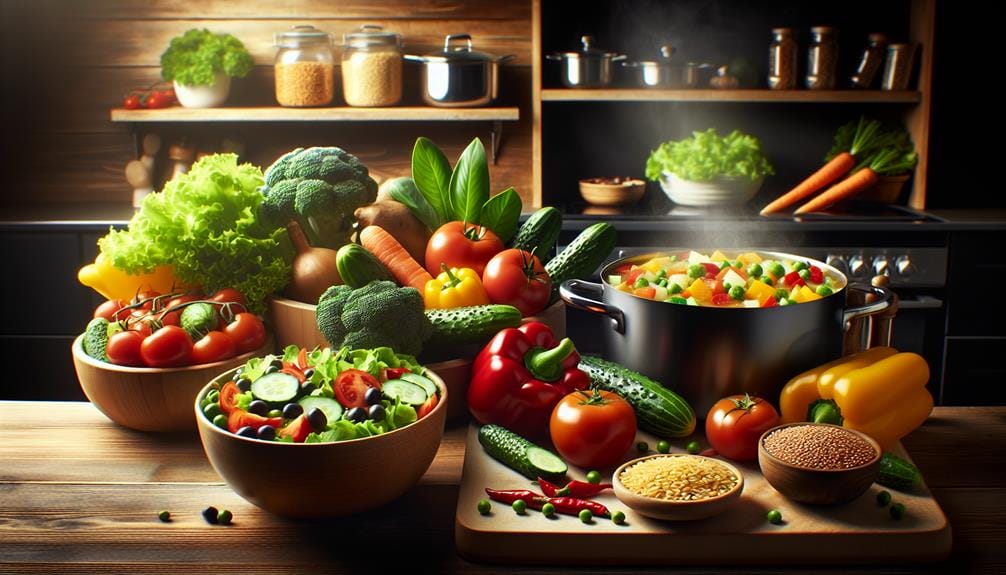
When embarking on a plant-based diet, you'll find that quick lunch ideas like lentil soup or chickpea curry can make your meals both easy and nutritious.
For dinner, try a hearty vegetable stir-fry or a comforting plant-based chili packed with beans and spices.
These simple recipes will help you shift smoothly into a plant-based lifestyle without sacrificing flavor or convenience.
Quick Lunch Ideas
Whether you're new to a plant-based diet or just looking for quick lunch ideas, these simple recipes will keep you satisfied and energized. Check out these tasty options:
- Quinoa Salad: Mix quinoa, vegetables, chickpeas, and lemon vinaigrette for a protein-packed boost. It's like a party in your mouth without the hangover!
- Vegetable Stir-Fry: Toss tofu, broccoli, bell peppers, and soy sauce together. Bam! Instant deliciousness.
- Black Bean Wrap: Combine black beans, corn, avocado, salsa, and cilantro in a wrap. It's a fiesta on the go!
- Mediterranean-Inspired Grain Bowl: Load up with falafel, hummus, cucumber, tomatoes, and tahini dressing. It's like a mini-vacation to the Mediterranean – passport not required!
Easy Dinner Recipes
Explore these easy plant-based dinner recipes that are both nutritious and delicious, perfect for any night of the week.
Whip up a hearty lentil soup, bursting with flavor and packed with protein.
If you're craving something quick, a vegetable stir-fry with colorful vegetables and whole grains is a fantastic option.
Feeling adventurous? Immerse yourself in a creamy chickpea curry that's as satisfying as it's tasty.
For something light yet filling, a quinoa salad with a mix of fresh veggies is ideal.
And let's not forget black bean tacos, a fun way to enjoy plant-based proteins.
These recipes are easy to prepare, budget-friendly, and packed with nutrients, making your plant-based journey both delightful and effortless.
Eating Out on a Plant-Based Diet

When eating out on a plant-based diet, it's important to do some research before heading to a restaurant. Start by looking up menus online to find suitable options that align with your dietary preferences. Clearly communicate your dietary needs to the staff when you arrive, requesting substitutions like tofu or beans instead of meat in your dishes. Opt for simple meals that are less likely to contain hidden animal-based ingredients, and consider exploring ethnic cuisines that naturally offer a variety of plant-based choices.
Research Restaurant Menus
Before heading out to eat, take a few minutes to research restaurant menus online to find plant-based options. Dining out can be a breeze if you look for dishes featuring vegetables, whole grains, and legumes. Many restaurants now offer veggie burgers, grain bowls, and plant-based proteins.
Be vigilant for hidden animal products like dairy, eggs, and honey. Planning your meal in advance can save you from a dining disaster.
Here's a quick checklist to help you out:
- Identify plant-based options: Look for veggie-packed dishes.
- Check for whole grains and legumes: They make meals more filling.
- Watch out for hidden animal products: Don't let sneaky dairy ruin your meal.
- Plan your meal: Avoid hangry moments by knowing your options.
Communicate Dietary Needs
Make sure to clearly communicate your plant-based dietary needs to the restaurant staff to guarantee your meal is free from animal products. Many restaurants offer plant-based options and are happy to accommodate your needs if you inform them in advance. Don't hesitate to ask about modifications or hidden ingredients like animal-based broths and sauces.
| Tip | Explanation |
|---|---|
| Check Menus Online | Identify plant-based options beforehand. |
| Ask for Modifications | Request changes to adapt dishes. |
| Inform Proactively | Be clear and polite about your needs. |
Dining out can be enjoyable if you're proactive. Arm yourself with knowledge and a smile—restaurant staff will appreciate your clarity and you'll avoid any surprise bacon bits.
Opt for Simple Dishes
Opt for simple dishes like salads, vegetable stir-fries, or bean-based soups to easily identify plant-based options at restaurants. You don't need to be Sherlock Holmes to find something tasty and plant-based.
Look for customizable meals, or a vegetarian/vegan menu, to dodge those hidden animal products lurking in broths and sauces. Plus, plant-based protein sources like tofu, tempeh, and beans can help you maintain a balanced diet.
Diverse options like Mediterranean, Asian, or Mexican cuisines offer flavorful choices that naturally fit your plant-based needs.
Here's your plant-based dining out checklist:
- Avoid hidden animal products in sauces and broths.
- Seek customizable meals to fit your diet.
- Check for plant-based protein sources for balance.
- Explore diverse options for new flavors.
Managing Social Situations

Handling social situations with a plant-based diet requires clear communication and a bit of preparation. Let people know your dietary preferences ahead of time. This prevents awkward moments and guarantees there's a plant-based dish for you.
When dining out, scout for vegan-friendly restaurants or ethnic cuisines with natural plant-based options. Don't be shy about asking for modifications; removing cheese or meat can transform a regular meal into a plant-based masterpiece.
At gatherings, offer to bring your own plant-based dish—consider it your tasty insurance policy. Seek support from friends and family who respect your plant-based choices.
With these strategies, you'll navigate social settings like a plant-based pro, without ruffling too many feathers.
Budget-Friendly Plant-Based Tips
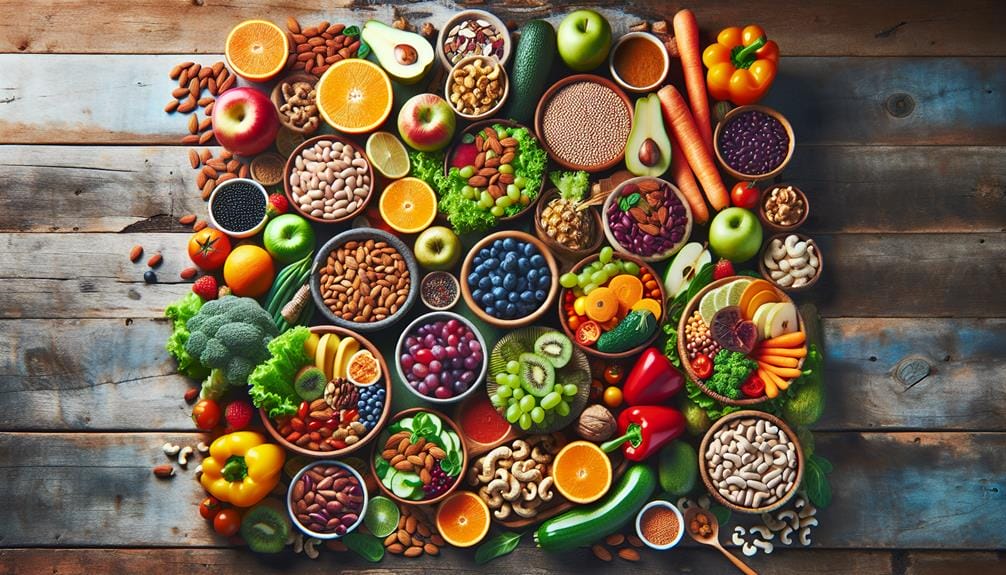
To keep your plant-based diet budget-friendly, focus on affordable protein sources like beans, lentils, and tofu, which are often cheaper than meat.
You can also save money by buying seasonal produce, as fruits and vegetables in season tend to be less expensive and fresher.
Planning your meals ahead and making a detailed grocery list will help you stick to your budget while ensuring you get a variety of nutritious foods.
Affordable Protein Sources
When you're starting a plant-based diet on a budget, legumes like beans, lentils, and chickpeas are some of the most affordable and nutritious protein sources available. They cost just pennies per serving, making them wallet-friendly heroes.
Don't forget tofu and tempeh; they're not just for hipsters anymore and offer budget-friendly protein.
Quinoa might be the priciest of the bunch, but it's a complete protein and worth the splurge occasionally.
Nuts and seeds, if bought in bulk, can save you some serious cash too.
Here's your plant-based protein shopping list:
- Legumes: Beans, lentils, chickpeas—cheap and versatile!
- Tofu and Tempeh: Affordable and protein-packed.
- Quinoa: Splurge-worthy complete protein.
- Nuts and Seeds: Buy in bulk for budget bliss.
Seasonal Produce Savings
Embracing seasonal produce can slash your grocery bill while providing fresher, tastier, and more nutritious options. Think of it as nature's way of saying, “Here, have some savings!”
By choosing fruits and vegetables at their peak harvest times, you'll enjoy budget-friendly prices and flavor-packed meals. Plus, you're supporting local farmers and reducing the environmental impact of long-distance transportation.
Whether it's berries in summer, squash in fall, citrus in winter, or leafy greens in spring, there's always something in season to spice up your plant-based meals. Plan your meals around these abundant goodies, and watch your wallet thank you.
Staying Motivated and Informed

Getting immersed in resources like cookbooks, documentaries, and online articles is key to staying motivated and informed about a plant-based diet. Delve into these materials to enhance your nutrition knowledge.
Engage in online communities or forums to exchange recipes and receive encouragement from fellow plant-based enthusiasts. Enroll in cooking classes or workshops to perfect those elusive tofu techniques. Follow plant-based nutrition experts on social media for daily tips and inspiration.
Here's a handy list to help you stay on course:
- Explore cookbooks and documentaries: Turn Netflix and chill into a nutritious adventure.
- Join online communities: Share your kale mishaps and quinoa victories.
- Attend cooking classes: Transform into a plant-based Picasso.
- Follow experts on social media: Your feed is about to become more vibrant!
Conclusion
Starting a plant-based diet is like sowing a vibrant garden of health and vitality. You've learned the essentials, from stocking your pantry to maneuvering social situations.
By focusing on nutrient-rich foods and staying informed, you'll cultivate a sustainable lifestyle. Embrace this journey with confidence, knowing each meal is a step towards a healthier, greener you.
Remember, it's not just a diet; it's a nourishing way to live, benefiting both you and the planet.
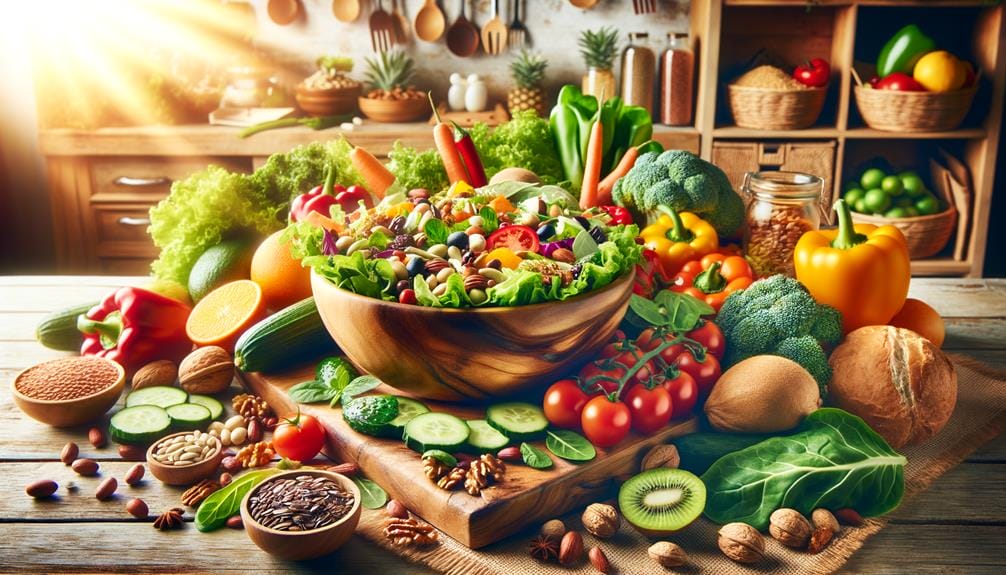
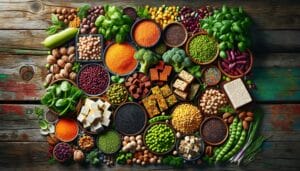

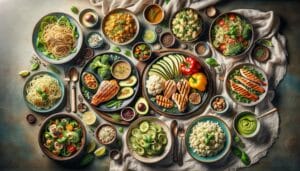





Leave a Comment